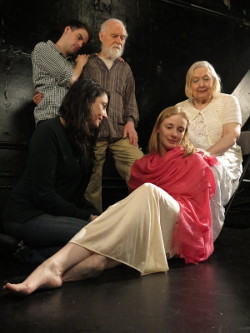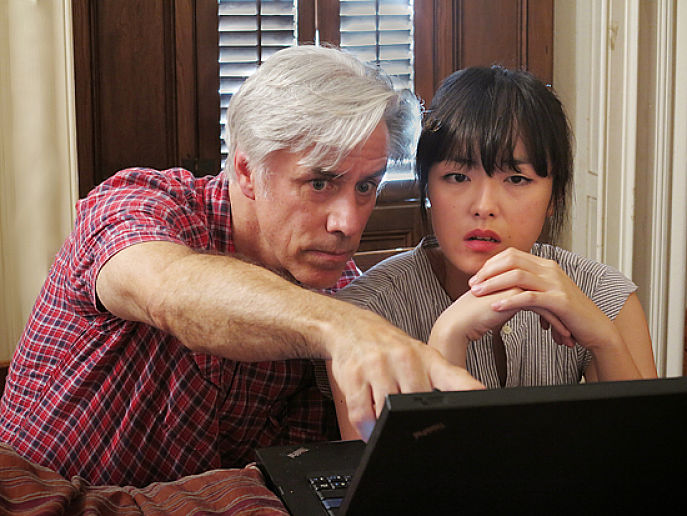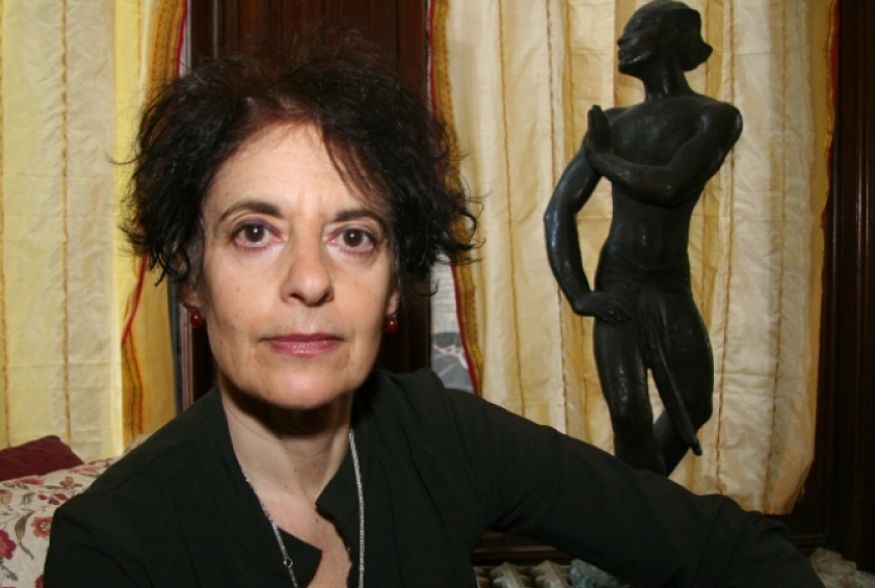Karen Malpede is a downtown New York theatre mainstay. Author of 17 plays, including the Obie-winning I Will Bear Witness, Prophecy, and Us, she’s known for her unflagging commitment to social justice. Her most recent work, Extreme Whether, addresses climate change, survival, and the magic of nature. In 1995, she co-founded Theater Three Collaborative with George Bartenieff and the late Lee Nagrin. Their inaugural work, The Beekeeper’s Daughter, is being remounted at Theatre for the New City in NYC from June 2–26. We corresponded recently by email.
When did you write your first play and what was it about?
In 1974, A Lament for Three Women. It was published in A Century of Plays by American Women. Three women meet in a hospital waiting room while their son, husband, and father are dying of cancer in rooms down the hall. It is a lament, both for their losses and for their dependency upon these men, and for the great suffering cancer and cancer treatments inflict on the body and soul. I was at the time working with Joseph Chaikin and the group he had assembled around him to discuss theatre in the immediate aftermath of the disbanding of his Open Theater. We were all agreed that we needed to turn to language, and that the physical experiments of the ’60s theatre allowed for a poetic language. Joe was an admirer of this play and he asked to direct it. For various reasons, I wanted a woman director. It was directed by another member of Joe’s circle at that time, Eleanor Johnson. Tina Shepard, and Sybille Hayn, both also from the Open Theater circle, were in it, along with Elia Braca. It was performed in natural light at sunset before an audience of Open and Living theatre people, including Joe, Judith Malina, and Julian Beck.
I’m curious about the genesis of The Beekeeper’s Daughter and what inspired it. I understand that you have a group called Theatre Three Collaborative, and that this was the first play produced under that umbrella. What made you want to revisit it now?
I had to found a theatre—I have actually cofounded two—in order to produce my plays. I could never have done this had I not met the actor George Bartenieff when he played 6 roles in Us, directed by Judith Malina, and for whom I have written a major role in each of my last eight plays. He is my artistic partner in the deepest sense: a muse, a guide, a goad, a teacher, and companion.
I had been reading and researching the lives of Robert Graves and Laura Riding, and also, as part of my lifelong fascination and study of Greek mythology and theatre, had read his book The White Goddess. I was deeply involved in the ecofeminist movement of the ’80s. I understood that traditional Western culture defines both Earth and woman as objects to be mined and exploited but that women, and some men like Graves, had stood against this tradition. Graves, along with Julian Beck and Allen Ginsberg, both of whom I knew—Julian very well—are the models for Robert Blaze in the play. These are men who redefined traditional ideas of masculinity in order to become themselves and affect change in the world.

I was teaching ecology and theatre at NYU; the great ecofeminist, trans singer Anohni was a young student in my class. Then the war in Bosnia exploded. George and I were vacationing at a castle in Umbria owned by friends. We were living in bucolic luxury, but it seemed to me I could feel the guns rumbling through the earth and hear the cries of those whose lives were being torn apart. That contrast between Western luxury and an upsurge of hysterical, xenophobic violence informed the play. Since then, xenophobic violence seems to be ascendant.
The Beekeeper’s Daughter is not about the Bosnian war; it is about what might happen if people acted toward one another with unusual caring and openness—what might happen if we were to embrace each other even through our suffering. The play is about the healing powers of empathy, myth, and art.
These connections are increasingly important now, when we are being told to be afraid, to hate, to disdain, when we are literally barricading ourselves within false boundaries and losing our sense of connection to others and to the natural world. This is why the gender-fluid movement is so powerful; it proves to us that we can change.
You have dedicated a large part of your life and work to politically charged, often pacifist work. Did those themes develop for you over time, or was there a moment when you knew that that was the work you needed to devote your life to? If there was a moment, please tell me about it.
My father, who was a victim of uncontrollable and terrifying rages that also victimized his family, was dying of a massively invasive cancer at the same time as the U.S. was beginning its long and terrible involvement in Vietnam. I understood as a teenager the toll violence takes on the body and, hence, the connection between war and the rot of the body politic. The personal became political. I knew our nation was embarking upon a disastrous and morally indefensible war, and, not, unfortunately, for the last time. Donald Trump’s candidacy is a direct result of our imperial foreign and oligarchic domestic policies: A nation cannot illegally invade, torture, drone, and imprison, plus destroy the ecosystem in pursuit of profit, and never hold itself accountable without suffering. This is how dictators come to power through the electoral process. Only now the fate of the natural world, not just of our nation, not just humanity, but the fate of all of life, is at stake.
In a previous conversation, you talked about your desire to address the issues surrounding Syria and forced migration. Do you have plans to write a play more directly about Syria?
The disastrous civil war in Syria was instigated by a long drought, caused by climate change, that created unrest and began the demands of the people for government aid and democratization of the regime. Assad answered with violence and the worst non-state elements responded to state violence. The result has crushed civil society ever since. There are parallels here with what happened with the breakup of the former Yugoslavia—and this is another reason to do The Beekeeper’s Daughter now.

But my interest as a writer is twofold: What are the antidotes to violence? And how do we create a culture that addresses life in the Anthropocene*, which is going to become increasingly difficult unless, of course, we change and grasp this moment to work together to save what is? Extreme Whether, my newest play, is about this, and whatever I write next will be too. We are facing a crisis of consciousness. As Robert says in Beekeeper: “I want to cry out, change form, change form. It takes but an instant to see the world in a new way.”
In advertisements for The Beekeeper’s Daughter, I see the family described as eccentric. Did the characters seem that way to you when you were writing them? Do they now? Is the family based on anything from your life, either directly or indirectly?
They are only eccentric because they are kind. Kindness and compassion only seem eccentric because we live in a world dominated by self-interest, fear of the other, and greed.
You have said that the ecofeminist theme in this play is as important as the themes of war and rape. Do you view ecofeminism as an antidote to war? As a guide to an alternative social structure? What, for you, is the relationship between beekeeping and ethnic cleansing?
The Beekeeper’s Daughter is a play set in nature. So is my most recent play Extreme Whether. In both plays the connection between poetry and nature is explored. In the program note to the current production of Beekeeper, I explain:
There was a feeling palpable in the 1980s and ’90s, gaining widespread traction once more with our increased understanding of perilous climate change, that poetry is wild nature produced by human nature; poetry is how we link ourselves to life, and that as we listen to poetic utterance we transform, shape change, become our opposites, become what we fear, and are reconstituted as fearless, new, and open.
I would add that as we kill nature, we kill our own ability to speak in poetry and to feel. This play is about the powers of poetry to heal the world.
How would you like your epitaph to read?
This is a great question because I often actually say this to George. I want my epitaph to read: “She tried.” I won’t have an epitaph, of course, because I want to be buried in one of those ecoboxes so that I turn into a tree. Then I can try again to grow.
*The term for the geological epoch in which human activities are having significant impact on the Earth and its ecosystems.


